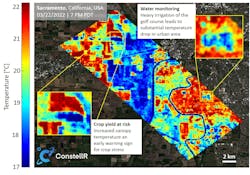NanoAvionics to supply Constellr with two satellites to help saving 60 billion tons of water globally
FREIBURG, Germany - Thermal data provider Constellr in Frieburg, Germany needed a small satellite (smallsat) integrator to help the company monitor agricultre water use from space. They found their solution from Kongsberg NanoAvionics in Kongsberg, Norway.
NanoAvionics has signed a contract with to supply Constellr with two of its flagship MP42 microsatellite buses. Germany-based Constellr will use the two satellites to develop the scalable water stress monitoring system.
NanoAvionics previously provided consulting services and a feasibility study for Constellr's initial satellite constellation. The thermal infrared payloads for the mission are developed by OHB, which is also one of the investors of Constellr. The two satellites will be deployed via a CarboNIX separation system, developed by German-US NewSpace company Exolaunch, in 2024.
Globally, more than 70% of freshwater is used for agriculture according to the Food and Agriculture Organization of the United Nations (UN). 60% of that goes to waste. The UN also estimates that 50% more food will be needed by the Earth’s population by 2050, leading to a massive increase of freshwater demand for irrigation.
Constellr is pioneering the use of thermal infrared microsatellites for a water stress monitoring system. Within five years, Constellr expects to help save 60 billion tons of water (about 40%) and avoid 14 megatons of CO2 being emitted while generating billions of Euros in gross benefits for farmers.
To mitigate this unsustainable situation and an inability to precisely measure the water needed in agriculture, Its satellite images and high-precision data will allow to recognise impending droughts earlier than existing methods and fast enough to mitigate trough targeted irrigation.
"With NanoAvionics’ expertise and their modular satellite buses, we have found a partner able to address the high-performance needs of our constellation, providing high agility, and stability as well as the significant power demand required to deliver high quality infrared images that allow us to precisely measure the water needed in agriculture," Marius Bierdel, CTO of Constellr, says.

